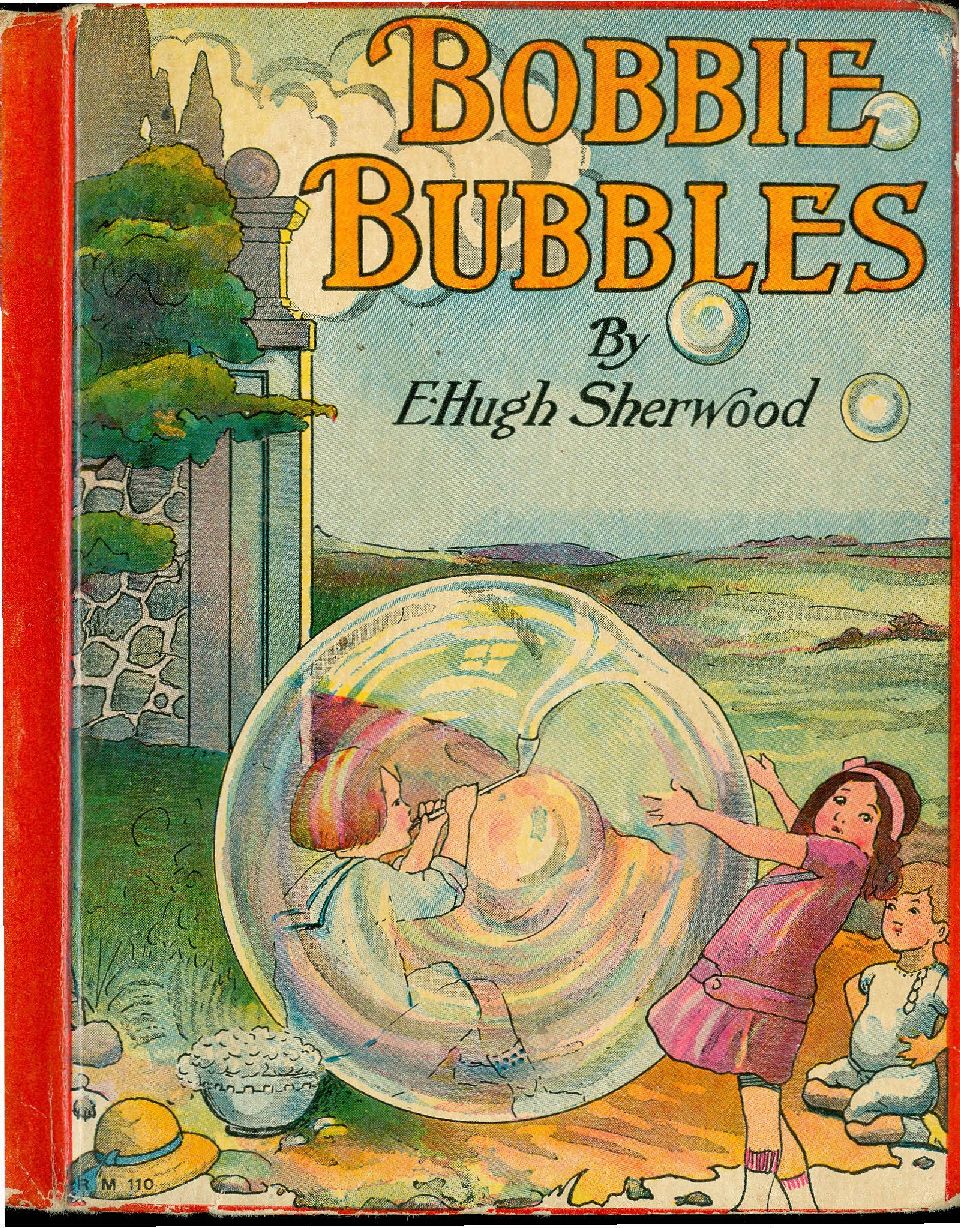
The Project Gutenberg EBook of Bobbie Bubbles, by E. Hugh Sherwood and Maud Gridley Budlong This eBook is for the use of anyone anywhere at no cost and with almost no restrictions whatsoever. You may copy it, give it away or re-use it under the terms of the Project Gutenberg License included with this eBook or online at www.gutenberg.org Title: Bobbie Bubbles Author: E. Hugh Sherwood and Maud Gridley Budlong Illustrator: E. Hugh Sherwood Release Date: March 7, 2014 [EBook #45070] Last Updated: March 16, 2018 Language: English Character set encoding: UTF-8 *** START OF THIS PROJECT GUTENBERG EBOOK BOBBIE BUBBLES *** Produced by David Widger from page images generously provided by The Internet Archive

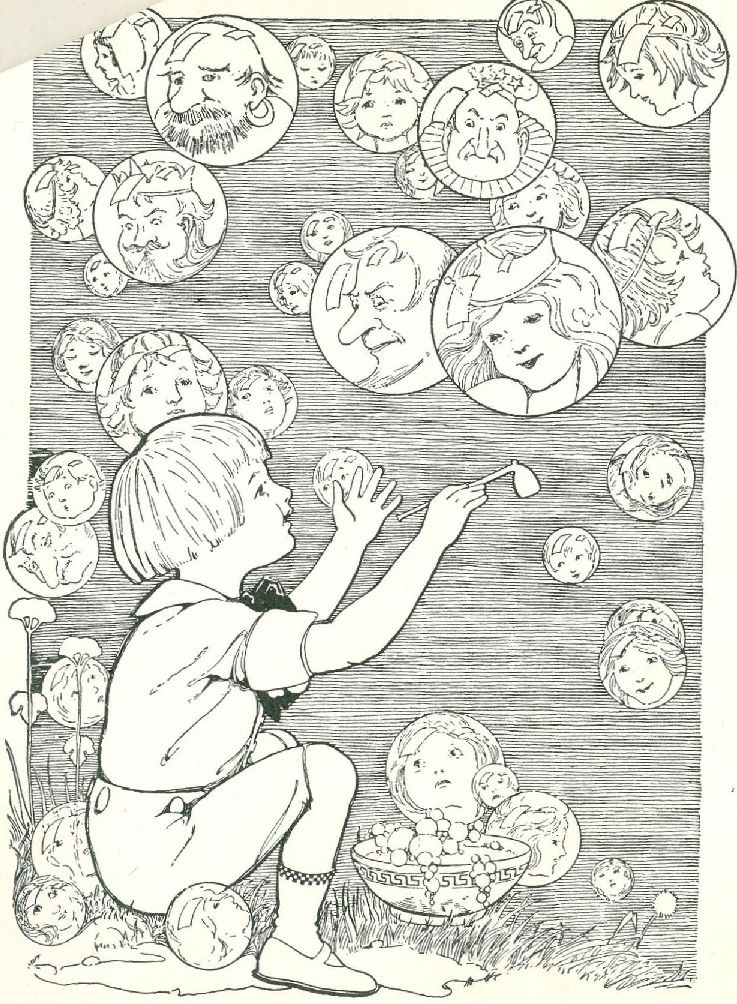
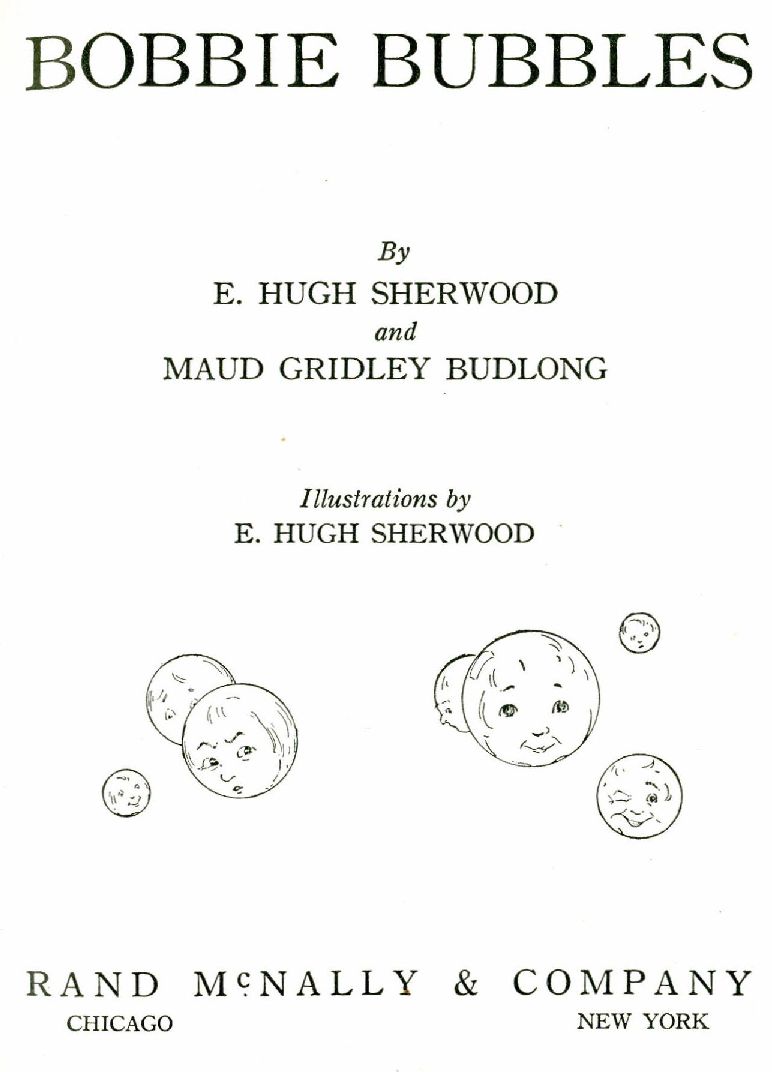
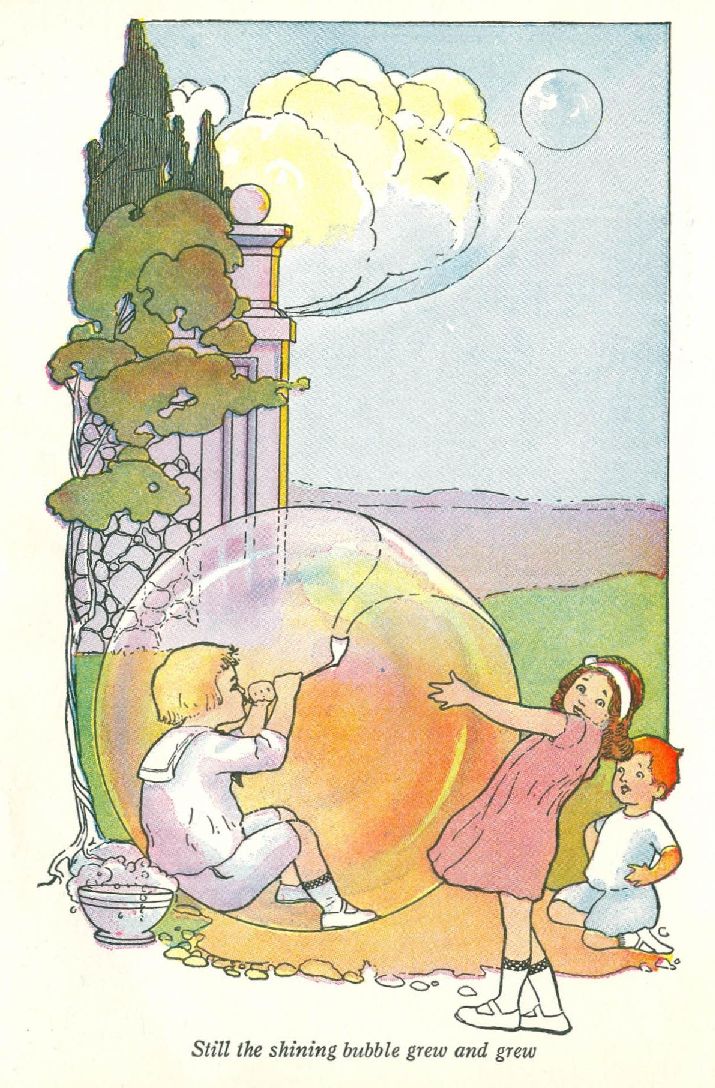
Bobbie Bubbles was the most wonderful bubble blower that ever lived.
No, his father's name wasn't Bubbles, and bubble blowing wasn't the family trade. Maybe the Smiths got their name because their great-great-great-grandfather's grandfather was a blacksmith, and maybe the Johnsons got their name because once, ages ago, a man named John had a son; but Bobbie Bubbles didn't get his name secondhand from anybody. He got it himself, because he was a famous person. And this is how it happened.
One day Bobbie and Betty and Billy were out in the garden blowing bubbles. They all blew bubbles, big ones and little ones, till evening came and it was almost time for tea. Then Billy said, “I can blow the biggest bubble anybody's blown to-day,” and blew a bubble as big as an apple.
“I can blow one bigger than that,” said Betty, and blew a bubble as big as a toy balloon.
“I'll blow a bigger one still,” said Bobbie, and he blew and blew, and the bubble grew and grew—as big as a pumpkin, as big as the snowball they'd rolled in the yard at Christmas.
Even then the wonderful bubble did not stop, but kept growing bigger and bigger. And still Bobbie blew and blew, and still the shining bubble grew and grew.
Then, wonder of wonders! The great shimmering bubble, floating in the sunlit air and glowing with all the colors of the rainbow, suddenly reached out and took in Bobbie—pipe, arm, and all.
Slowly the bubble rose with the surprised Bobbie and, light as thistledown, floated gently to and fro in the soft summer air just above the garden.
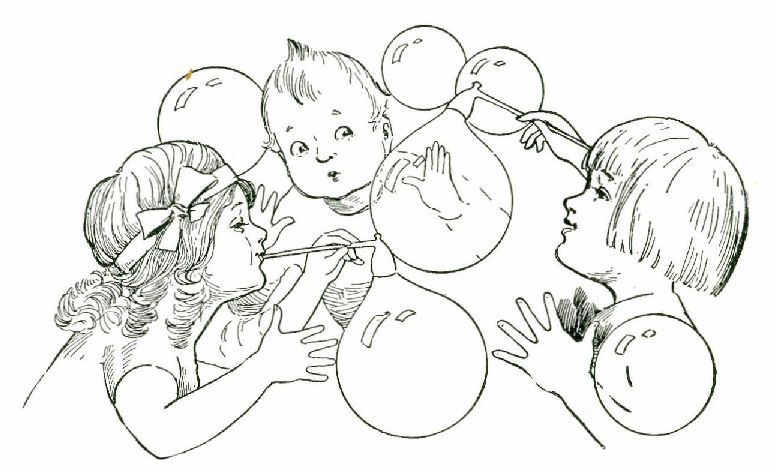
“Dear me!” thought Bobbie, looking down through what seemed like walls of gleaming crystal. “Dear me! That's not our garden where Betty and Billy and I blew soap bubbles. No, that rainbow-colored place looks just like Fairyland in our story books. Really, now,” thought he, “have we sailed over into Fairyland?”
Then, just as he was wondering what would happen next, along came a puff of wind, and, whiff! away sailed the bubble with Bobbie in it.
Over the trees they went, up toward the clouds. Bobbie looked down through the bubble and saw his house grow smaller and smaller. Soon the whole village was only a little dark speck.
Honk! Honk! Honk!
“Mercy!” thought Bobbie. “Have they automobiles up here?” He looked around at the smooth sides of his delicate airship, but there was no way to steer it that he could see. Honk! Honk! Honk!
“I can't!” shouted Bobbie. “I'd get out of the way if I could, but—”
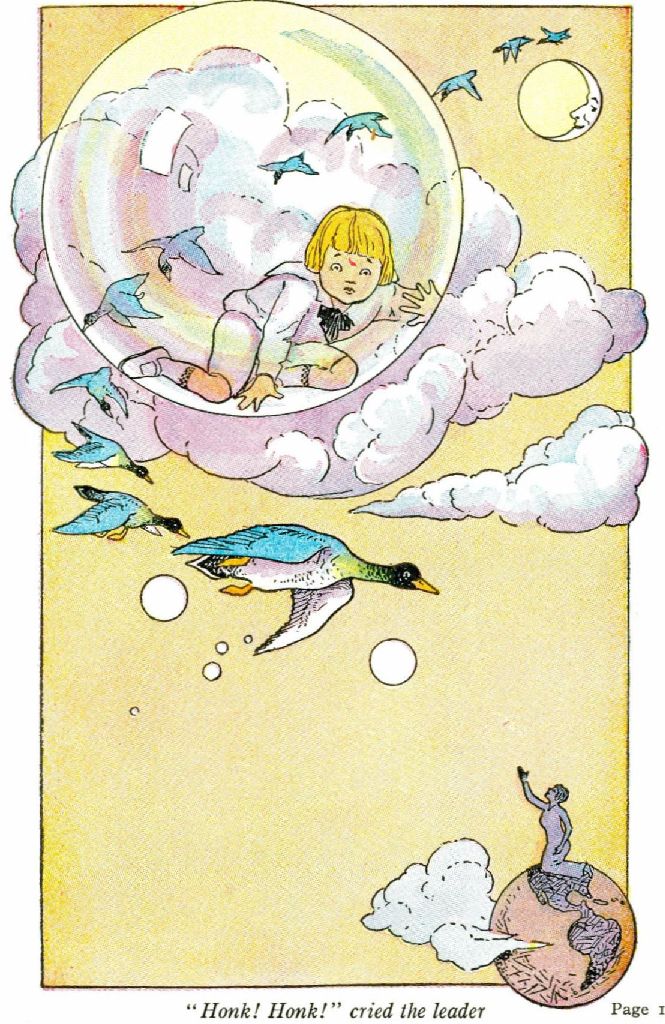
By this time he'd managed to wiggle around in the bubble so that he could see what was behind him. It was a flock of geese.
“Honk! Honk!” cried the leader again. He seemed to be dashing straight toward the bubble.
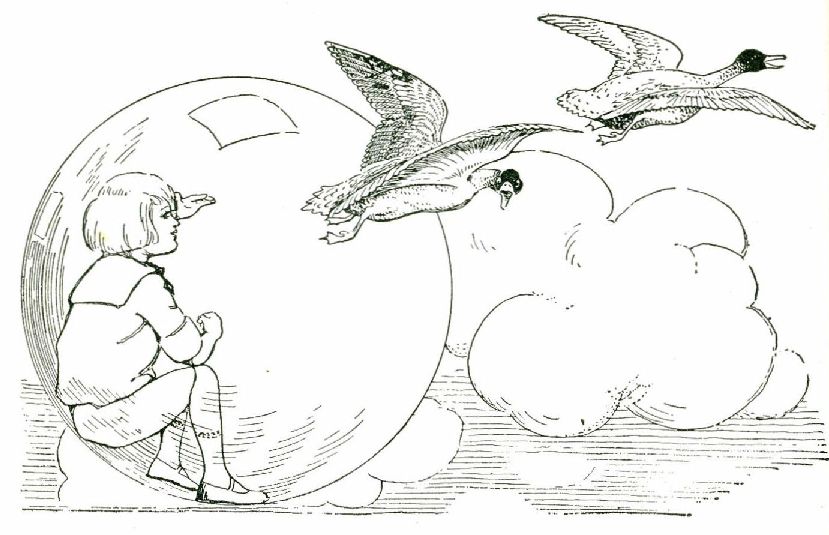
“I'd get out of the way if I could—” began Bobbie once more.
“Certainly, certainly,” the goose interrupted rudely, “but there's no occasion. Don't you think we've made this trip often enough not to run into things?”
“But you honked,” said Bobbie, as the goose flapped his great wing within a feather's breadth of the bubble.
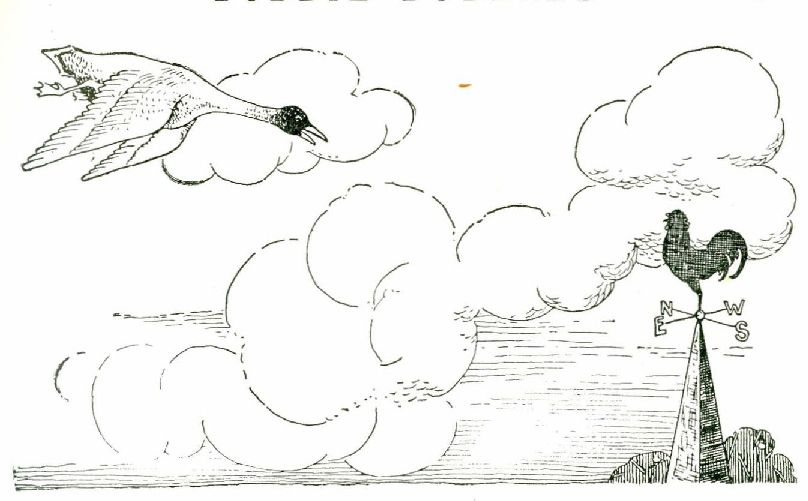
“Why have a danger signal if you don't use it?” answered the goose, craning his head back over his wing; and in a moment nearly the whole flock had skimmed past and were honking away again, though there was nothing in the sky that Bobbie could see.
“What are they honking at now?” he cried to an old goose, straggling behind.
“That rooster on the weather vane,” said the goose. “It'd better look out. It's only two miles off.” And he went honking on after the others.
Up soared the bubble, and Bobbie soon saw that the clouds now formed themselves into a long, crooked roadway lined with little houses and barns and windmills. Tiny cows grazed on the fleecy pink clouds, like cows in a meadow of pink and white clover. And, strange to say, what had looked like stars were buttercups—golden buttercups.
Soon Bobbie sailed up close to a funny little farmer who was milking a cow.
“Please, sir,” Bobbie called to him “will you tell me what country this is?”
The little farmer turned around in such surprise that his stream of milk followed his glance, and came splashing against the side of the bubble. Bobbie held up his hands, for he was thirsty. But the bubble was like a big glass, with Bobbie on the inside and the milk on the outside—and not a drop came through.
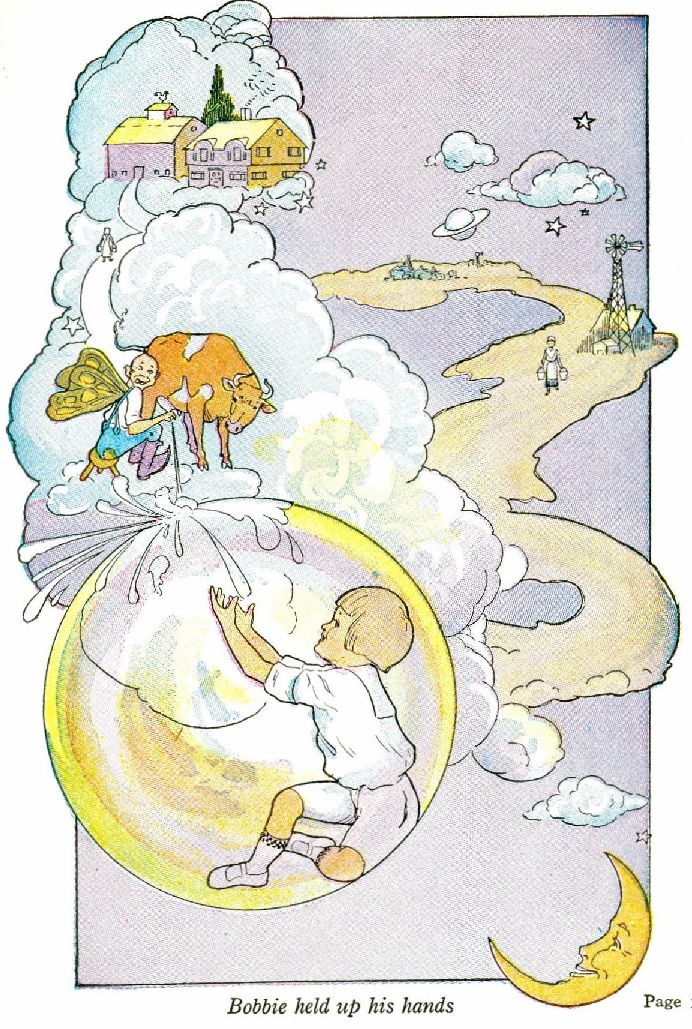
“Oh, whizaphats!” said Bobbie in disgust. “We don't put even goldfish in such a mean thing as this. At least we leave a hole in the top to put food in!”
“Eh? What's that? I can't hear you,” said the little farmer in a squeaky voice.
“Oh!” said Bobbie. “Oh! I was asking you what country this is.”
“The Milky Way,” answered the little farmer. “This is where we make cheese and butter for his Beaming Majesty the Moon. I'm Chief Cheese Server,” he added proudly.
Majesty! Was that jolly looking man in the moon, who'd winked at him so many times, a king? He didn't act very dignified.
“Must be some relation to Old King Cole,” thought Bobbie. But before he had time to ask about this, up jumped the little farmer in such haste he overturned his milking stool, which rolled down perilously near the bubble.
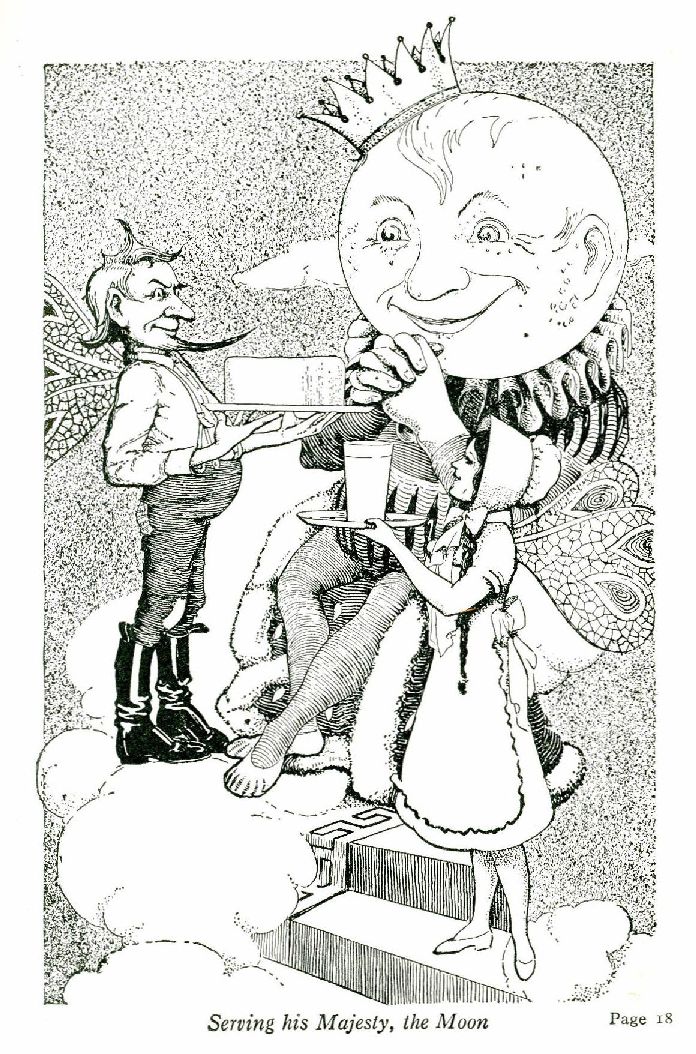
“Time to serve his Majesty!” he cried, and dashed into the house for his court costume. A second later he appeared wearing a wig and goatee like Uncle Sam's and carrying a big cheese on a gold plate. Behind him came a pretty little milkmaid with a glass of buttermilk.
“Follow us,” the farmer called out to Bobbie, and the bubble bounced along after them.
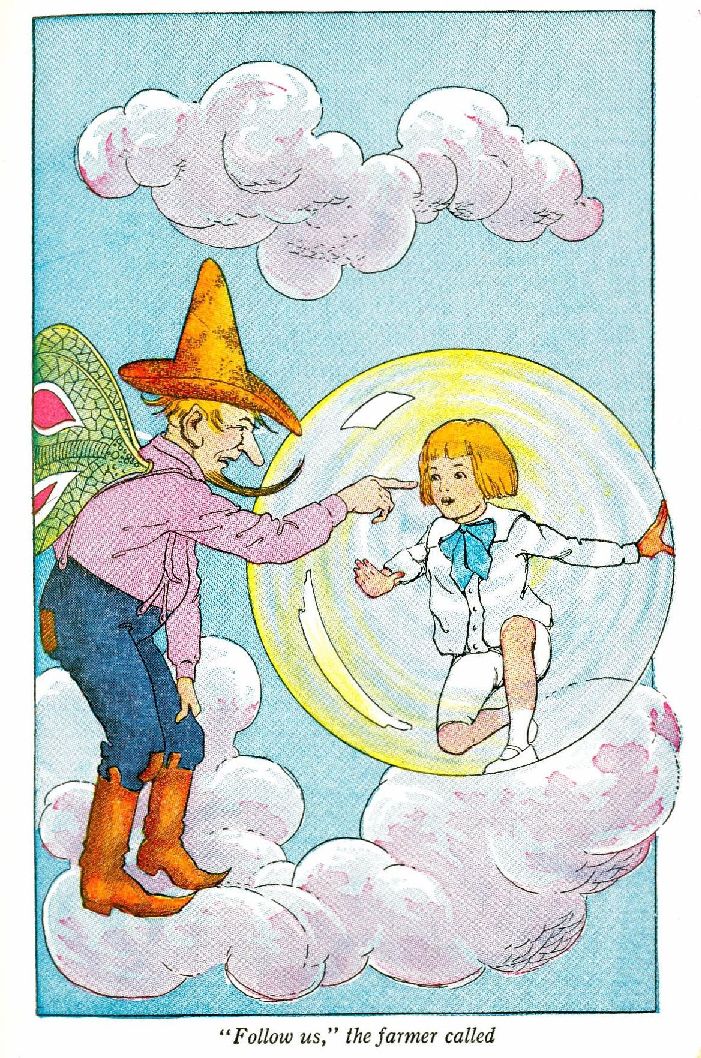
They didn't seem to have time to wait for Bobbie, and when he reached the door of the great hall he saw the moon beaming down on them as they stood before his throne. Bobbie wondered what he ought to do when he got in, but just then the bubble was caught up by the wind again, and sailed gently on.
“Well, it's all very queer,” said Bobbie. “Anyway, I found out that's all wrong about the moon's being green cheese.”
[Ill 9023]
Now just about this time it chanced that the King of Mars picked up his powerful spyglass and began to scan the heavens for signs of possible war. He was a crusty old fellow, the King of Mars, and nothing delighted him so much as to stir up trouble. In fact, he was one of those people who to make things unpleasant, half the time they don't mean to. Even in his own court, where he always manage when at least wished to appear very nice to every one, his wife was always having to step on his toes—under his royal robes, of course—to remind him to be polite. She'd stepped on them so often, indeed, that he had to have one foot bound up in a bandage.
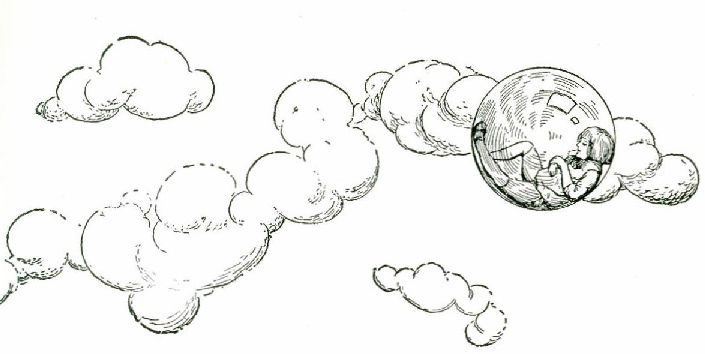
Now when the king looked out, everything seemed very peaceful and uninteresting. There were the golden buttercups and the fleecy meadows of the Milky Way, and the calm blue sea of the sky—all quiet and everyday looking.
But at length, as he looked at the sky, the king saw a little shining ball sailing up into the air. What could it be? A new planet, perhaps. He sent post haste for charts and maps, but not a thing could he find about any such fairylike world. He was about to declare himself the discoverer of a new heavenly body and to summon his army to conquer its people when another glance through his glasses showed him that this little globe had only one inhabitant, and that one a little boy!
However, no telling but even this little boy might be a spy from some distant land and dangerous, so he summoned his soldiers and ordered them to capture the stranger.
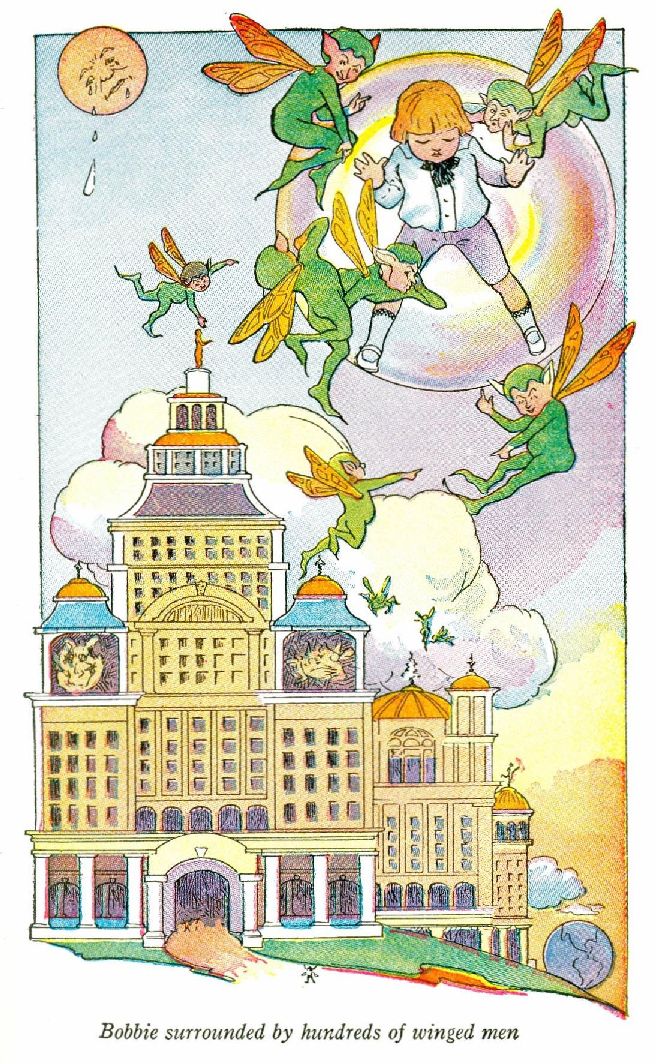
Away went the soldiers at double quick, and in a moment Bobbie was surrounded by hundreds of little winged men. They had large heads and queer faces; but fortunately, when they saw Bobbie and his frail little “world” they thought it a huge joke and quite forgot to look warlike. They seized the bubble, however, and soon Bobbie was hovering over a great building that reminded him of pictures of either the English House of Parliament or the New York Terminal, he couldn't remember which. Anyway, it was very large and very high.
The king was greatly disappointed to see what a little world he'd found, but nevertheless, he commanded Bobbie to come forth and swear allegiance to him.
Now Bobbie would have been very glad, indeed, to step out of the bubble if he could have gone home, but he didn't much like the looks of the King of Mars. Anyway, as you know, it was quite impossible for him to leave the bubble.
“I can't get out, your Majesty,” he said; “and besides, I'm not allowed to swear, so it wouldn't be any use to get out for that.”
“Indeed!” cried the king in a great rage. “Indeed! Haven't I conquered your whole world and brought you here prisoner?”
“Why, no,” answered Bobbie, frightened to see the king so very angry. “You haven't conquered my world at all. You don't think this little bubble is a world, do you? It's nothing but soap and water and air—a fairy balloon, my mother says—though why it's grown so big and sailed off with me like this, I'm sure I don't; know.”
“Oh, it's water, is it? Well, then, why don't you say flowing? Say flowing, not sailing. Water doesn't sail, it flows,” cried the king. “Your language is something terrible. The whole thing's a case for the naval authorities. Admiral, scuttle this water balloon so the prisoner cannot flow away, and put the enemy under guard. But mind you don't wreck the water balloon. We'll use it as a model for our new fleet.” Poor little Bobbie! He had stuck a pin in a soap bubble one day, and he remembered how suddenly it collapsed into a little spot of soapy water. If they scuttled his bubble now, how would he ever get home?
The king's funny little special guard was rushing forward with his spear to pierce the bubble, and Bobbie was almost ready to cry, when he heard a tinkling voice, and looking up he saw the daintiest of little fairies standing before the king. Without a doubt she was queen of the fairies. Bobbie seemed to know her quite well, he had seen her picture often in his picture books at home.
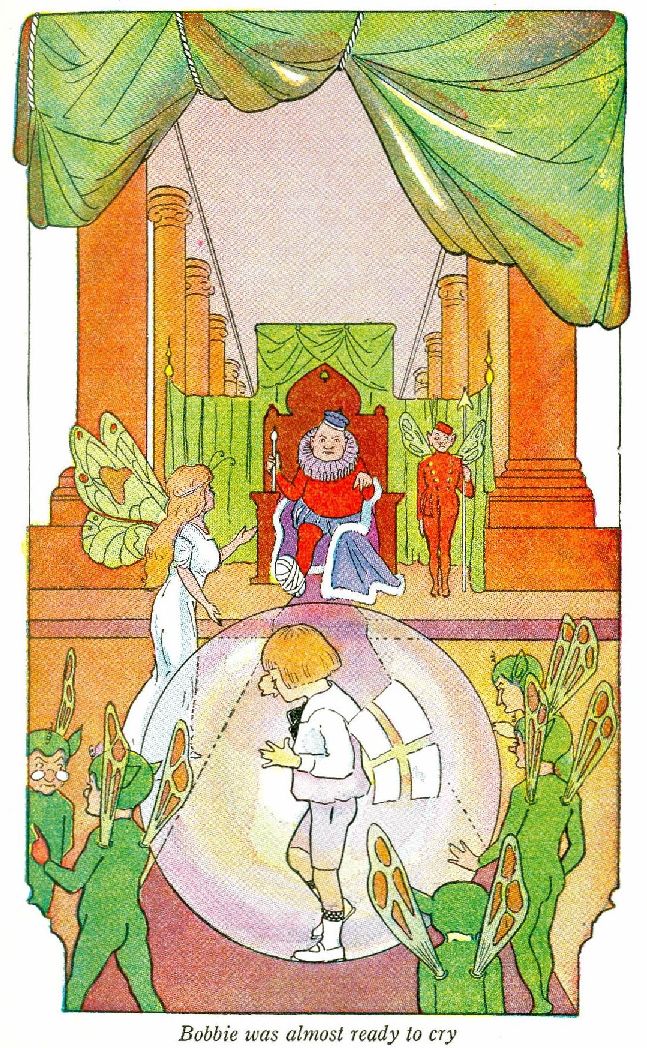
“Your Majesty,” she was saying, “this little boy is no enemy of yours. His mother was quite right; what you thought was his world is indeed a fairy balloon, and though he didn't know it, he is on his way to Flowerland at the special wish of the fairies. Will you not let him go?”
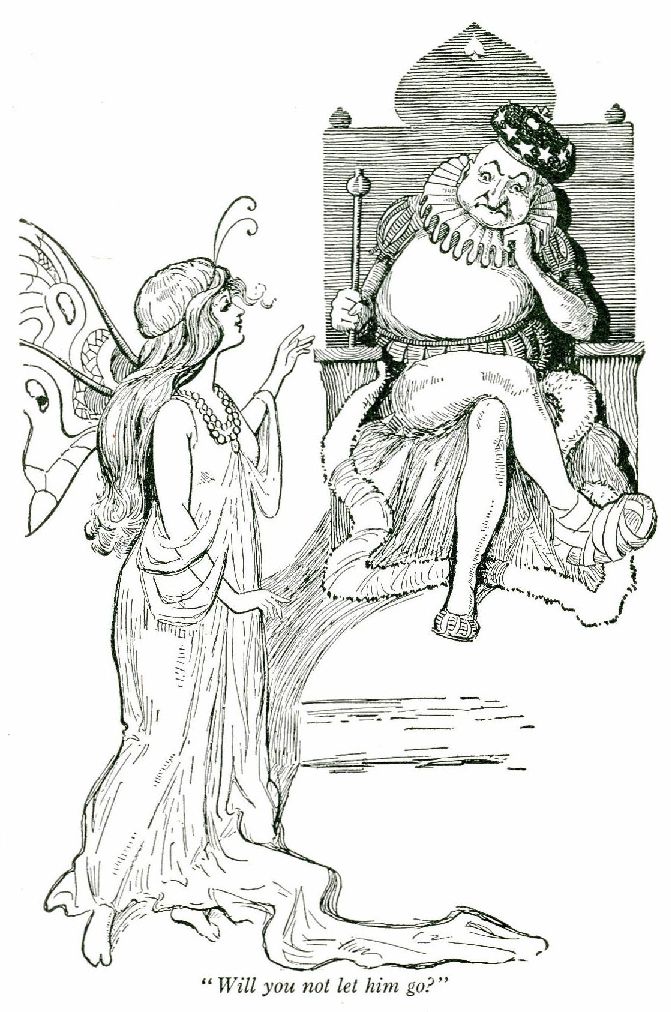
Now the King of Mars well knew the power of the fairies, and he usually listened to what they said; but it made him so angry to think he'd made such a mistake as to believe the fairy balloon a new world he shouted, “No! I'll not let him go! Put him under guard. Put 'em both under guard—put—” But before he could say another word, with a great buzzing and whirring, a whole host of fairy soldiers had fallen upon him. They stabbed the poor king right and left with their sharp little sabers and bayonets, so that he shrieked with pain and rage and—quite forgetting his bandaged foot—rushed down from his throne toward the door of the palace. Then the fairy soldiers fell upon the king's funny little admiral, and all the king's men, and drove them off helter skelter. The soldiers followed swiftly after them, and when they rushed past Bobbie, to his surprise he saw they were a swarm of bees!
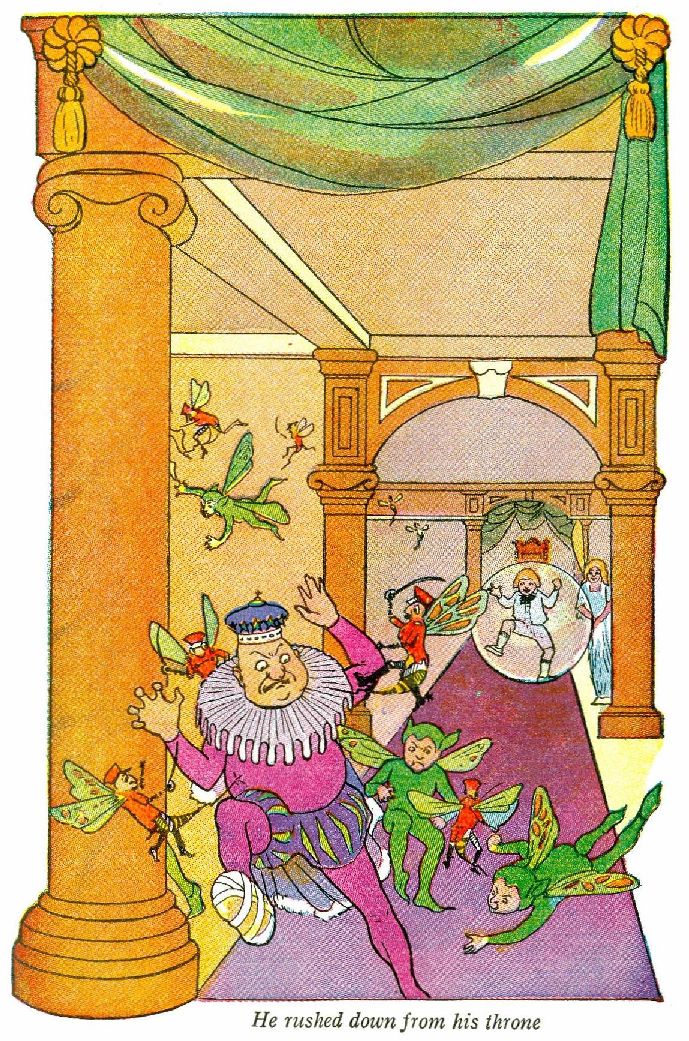
At the same time the bubble began to rise. As it floated through the window Bobbie could see the king and his men tearing madly round and round the palace yard. My! how angry they were, and how their arms and legs did smart where the soldiers had stabbed them!
They stabbed the poor king right and left with their sharp little sabers and bayonets, so that he shrieked with pain and rage and—quite forgetting his bandaged foot—rushed down from his throne toward the door of the palace. Then the fairy soldiers fell upon the king's funny little admiral, and all the king's men, and drove them off helter skelter. The soldiers followed swiftly after them, and when they rushed past Bobbie, to his surprise he saw they were a swarm of bees!
At the same time the bubble began to rise. As it floated through the window Bobbie could see the king and his men tearing madly round and round the palace yard. My! how angry they were, and how their arms and legs did smart where the soldiers had stabbed them!
The fairy summoned her soldiers, and the next instant they were all sailing away.
To Flowerland the wee fairy took Bobbie, and here were sights to gladden one's heart. As far as he could see, spread great beds of brilliant tulips and nodding columbine, towering flowers that Bobbie could not name, and delicate trailing vines. Bees and butterflies half hidden in the blossoms made fluttering bits of brightness. Beautiful dragon flies darted about, and Bobbie could hear the soft whir of the humming birds' wings, though all he could see of them was a gold-green flash as they darted from flower to flower. The air was sweet with perfume, and as Bobbie gazed about there suddenly burst through the blossoms a band of smiling fairies.
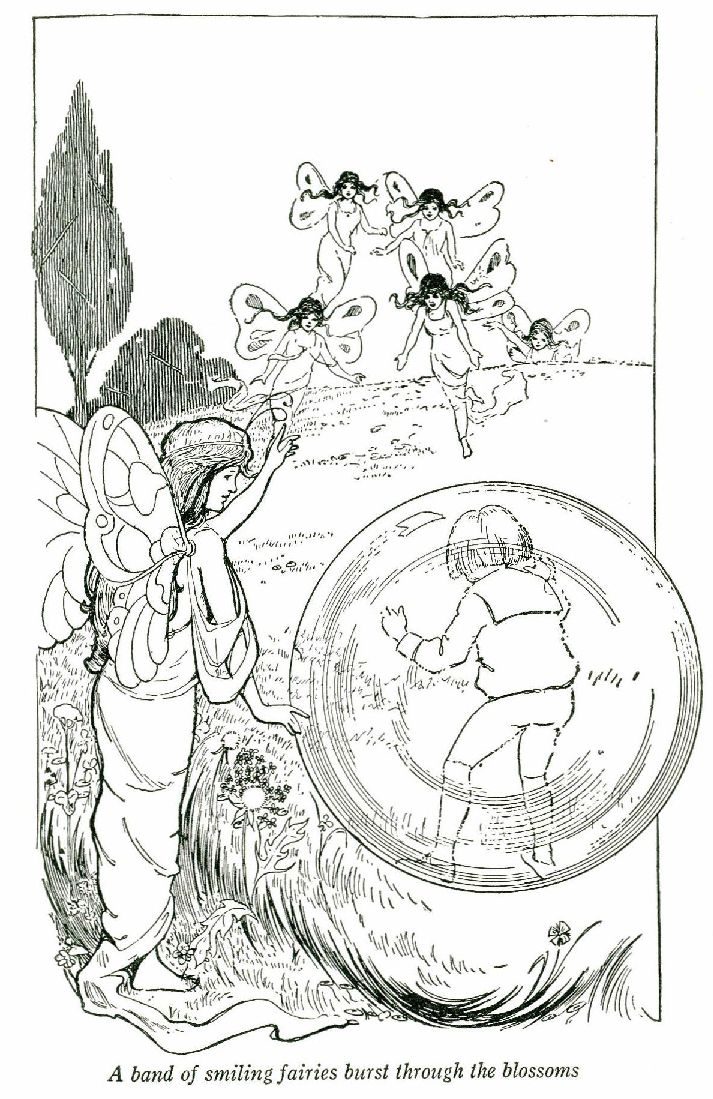
There were seven of them, dressed in the seven colors of the rainbow, and as the dew-drops fell from the flowers upon their wings they sparkled like diamonds in the sunlight.
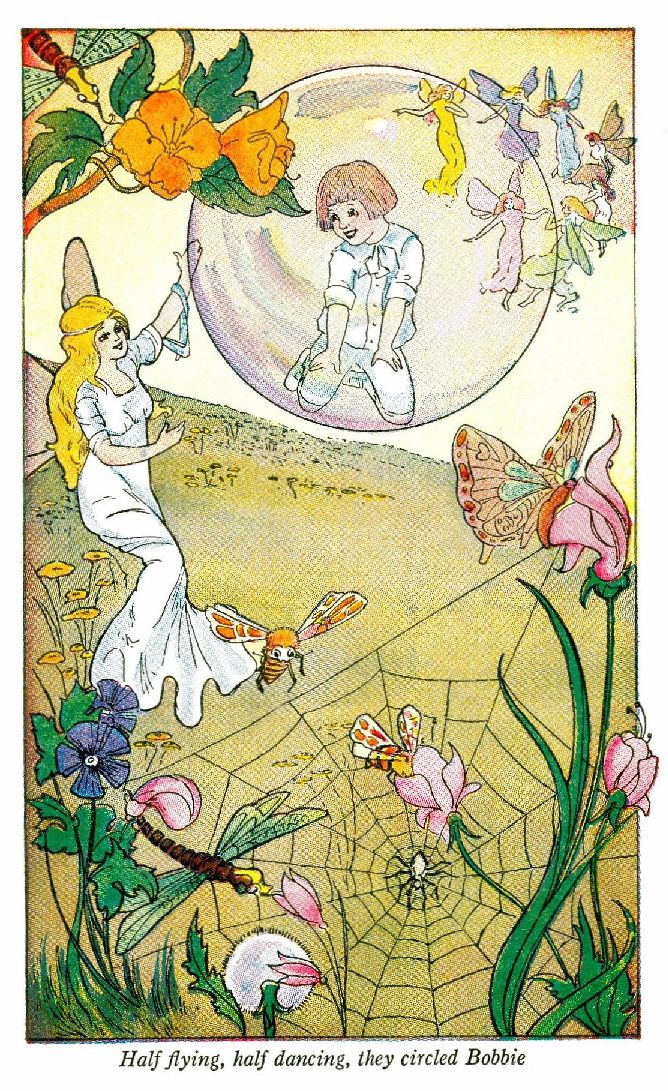
Half flying, half dancing, they circled round Bobbie and his fairy and led them to a tiny bower overhung with vines. In the center stood a great toadstool that served as a table, and around it smaller toadstool chairs. Upon the table was spread a wondrous banquet. There was honey in dainty flower cups, and the most delicious-looking food that Bobbie had ever seen. Gay-winged butterflies with lily-pad trays and little butler bees in smart striped waistcoats hovered about to serve the banquet.
As Bobbie and the queen approached the table, five other fairies came tripping into the bower. “These are my faithful helpers, Bobbie,” said the queen, “my Right-hand Fairies. Thumb, how went the day?”
“Most happily, your Majesty,” answered a little fairy in a tight-fitting suit, and as he spoke he made a quick bow backwards, for all the world like a thumb straightening up stiffly.
“And yours, Pointer?” asked the queen.
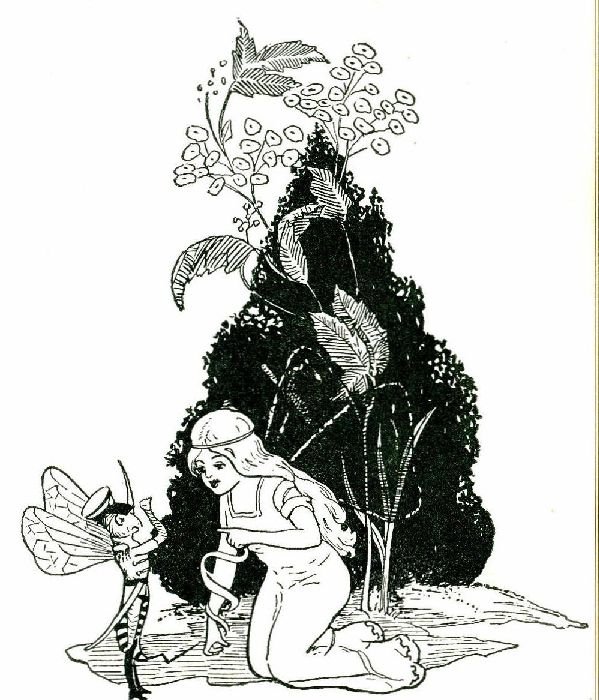
“The same, your Majesty,” answered the fairy next to Thumb, and as she spoke she made a most curious bow with her whole body bent over from the ankles, so that she looked like a finger pointing straight and stern.
“And Middleman?” asked the fairy queen, addressing the tallest of the five.
“Most excellently, your Majesty,” replied Middleman. He was so tall and dignified he scarcely bowed at all.
“Circlet next,” said the queen, and the fourth little fairy made a correct bow from the waist, like a polite gentleman at a ball.
“Delightfully, your Majesty,” he said. “And how did your day go, Little One?” said the queen, turning to the smallest of the fairies.
“It was a beautiful day, your Majesty,” she replied, and made a little curly looking bow so that her hair touched the floor.
“Ah, then,” said the queen, “let us refresh ourselves.”
So they all gathered around the table and the bees and butterflies began to serve them—all but Bobbie; for the bubble was still as smooth as glass. He remembered how he had tried to get a drink in the Milky Way, and looked at the queen questioningly. She turned to him.
“You cannot leave your fairy balloon, Bobbie,” she said, “unless you will stay with us a hundred years. But you need only wish for whatever you would like to eat, and you will find it in your hand.”
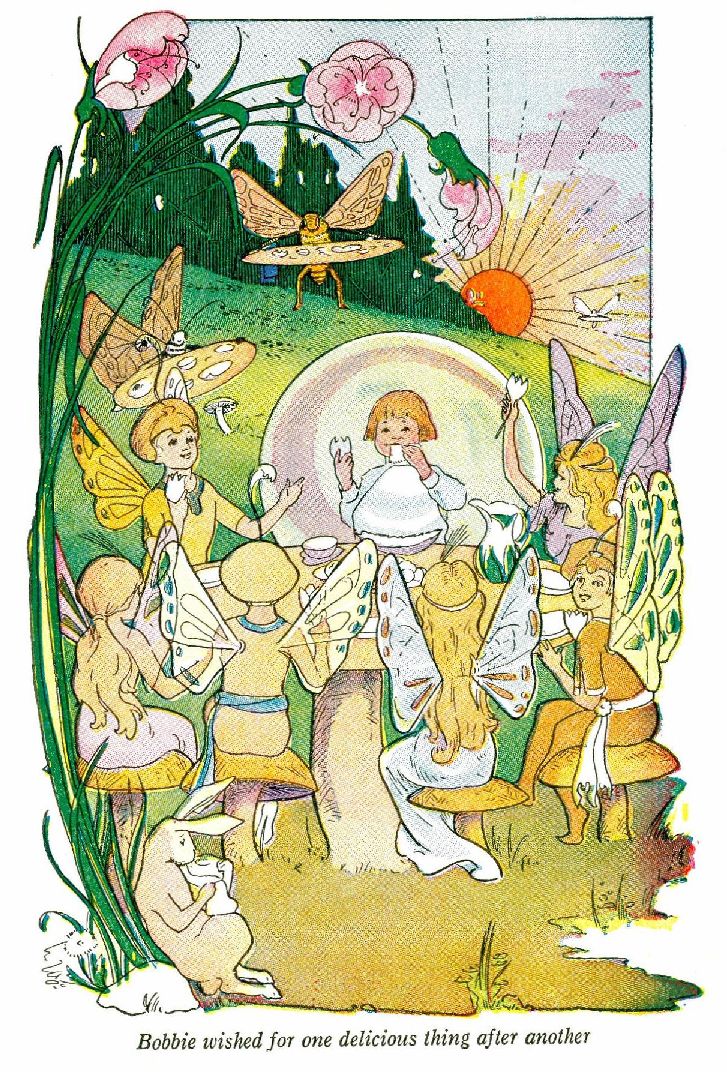
So Bobbie wished for one delicious thing after another, and each tasted better than the last. As the sun went down, fireflies danced into the bower and lighted it with their tiny candles until the moon spread its soft white light over all the land.
Then, the fairy banquet finished, the queen rose from the table. “Now for a frolic,” she said to Bobbie, and as the Right-hand Fairies circled about them she led the way to where all the fairies of Flowerland were dancing on the green. Bobbie, of course, could not dance, shut up in the bubble, but Bobbie wished for one delicious thing after another he was so interested in watching the fairies' graceful, fantastic figures and mischievous pranks, he never thought of dancing himself; and when at cockcrow the fairies suddenly slipped out of sight in the flowers, he could scarcely believe it was day.
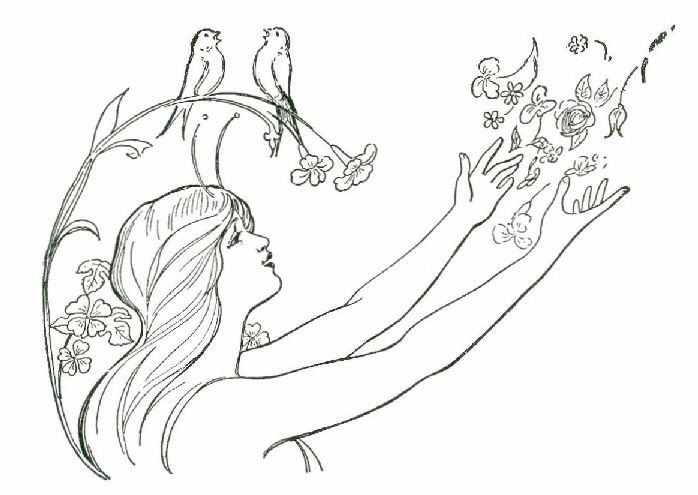
Back to the bower floated the bubble, and Bobbie slept until the sun was high in the morning sky. Then the fairy queen called him, and he awoke to see the Rainbow Fairies just outside. They were seated on brilliant butterflies which were harnessed to a spiderweb net.
“To-day you shall visit the Rainbow,” said the queen.
“And see the pot of gold?” asked Bobbie.
“Yes,” answered the fairy, “and all the countless treasures the Rainbow Dwarf guards there.”
[Ill 945]
Then the Rainbow Fairies slipped down from the butterflies and threw the silken strands of the spiderweb net over the bubble.
The fairy queen mounted her own golden butterfly, and away they flew.
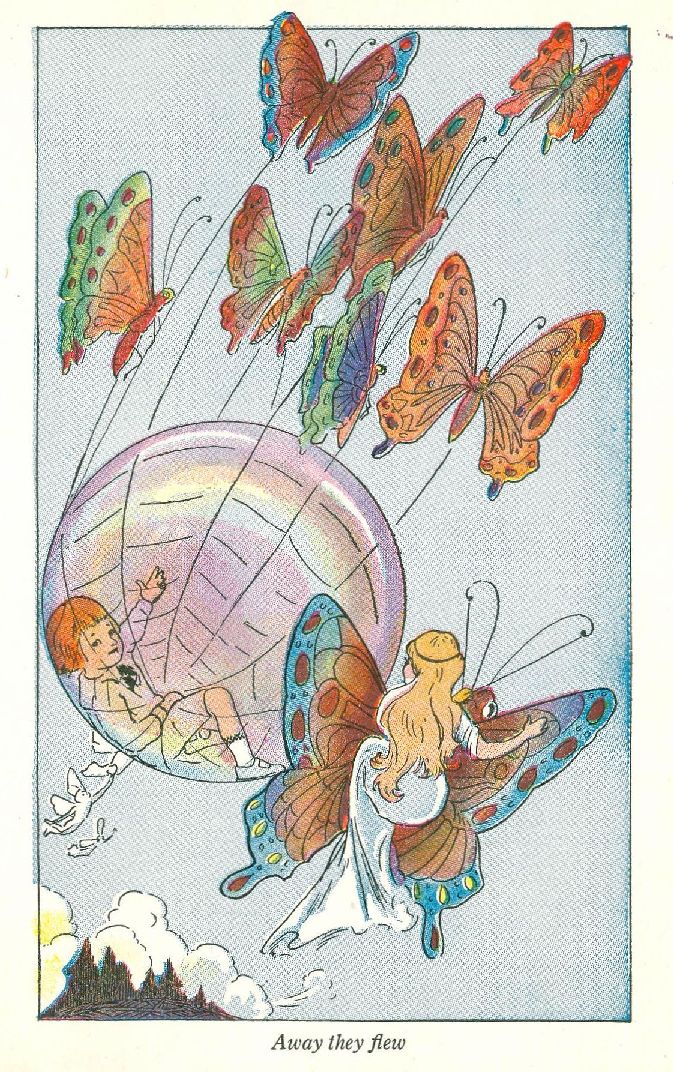
They hadn't gone very far when they met the four little Breezes frolicking in the air. They bobbed their heads up and down three times out of respect to the fairy queen, but all the time they were looking out of the corners of their eyes at Bobbie.
“These are the Breezes, Bobbie,” said the fairy, “the sons of the four Winds,” and turning to them, she added, “But perhaps you know Bobbie?”
Bobbie was sure he had never seen the Breezes before, but they seemed to know him.
“Oh, can't he stay and play with us?” cried West Breeze. But at that moment a big dirigible came in sight, and the four little Breezes went scurrying away.
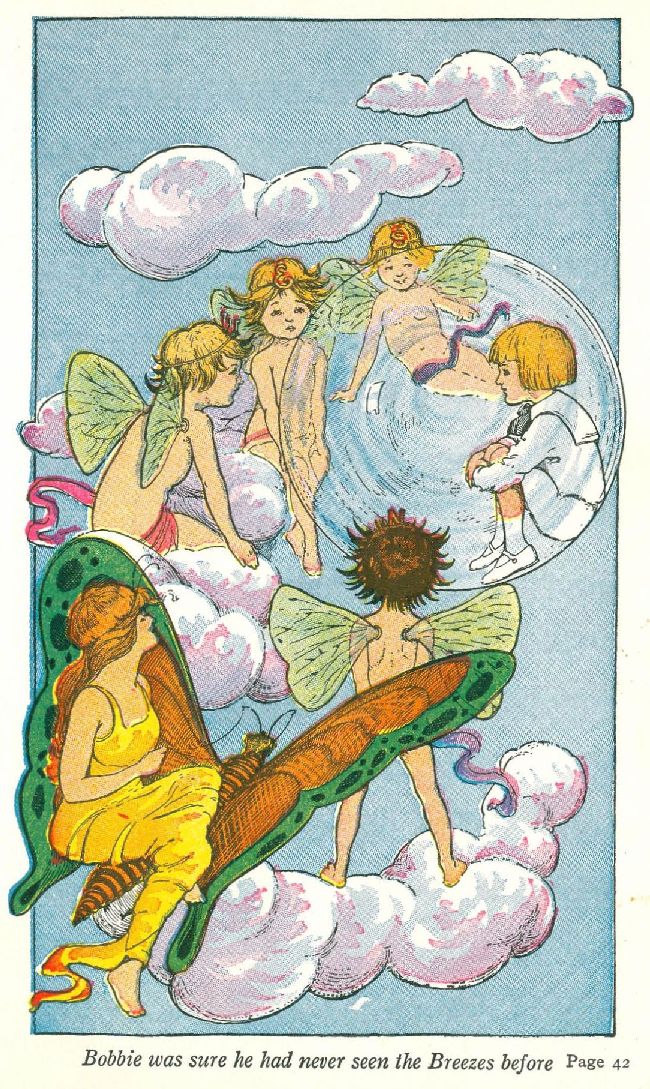
In it were four strange looking persons. Bobbie thought they must be sky pirates until the fairy introduced them as the four Winds! He wondered how such dreadful looking fathers could have such nice little sons.
“Bobbie has been my guest since yesterday, and we 're now on our way to the Rainbow,” explained the fairy.
“We are on our way to the Rainbow, too,” said North Wind, and his breath was so chilly the butterfly steeds huddled together in fright.
“Let us take Bobbie with us, your Majesty,” said West Wind, and gave Bobbie a tremendous, friendly wink. “He ought to have a ride in our new dirigible—it's great!”
Bobbie did wish he could have gone with the little Breezes instead of with their fathers, but he did n't like to offend West Wind, so he said, “I'd be glad to go with you, but I'd rather ride in my own balloon, please.”
“Very well,” said the fairy. “That will be delightful, and I'll leave you. Have a good time!” and with that she waved good-by and flew back toward Flowerland with her butterfly team.
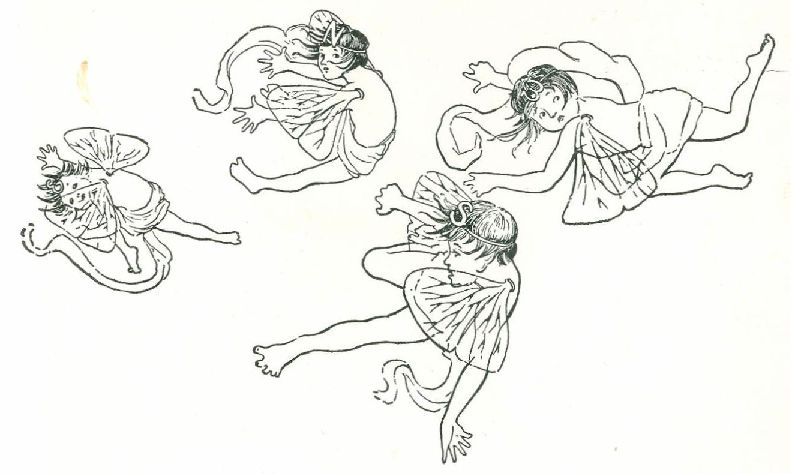
The bubble floated alongside the dirigible, though the four Winds made such a gale with their constant talk and laughter the bubble certainly would have been blown to pieces if it had n't been a fairy balloon instead of an ordinary bubble. As they went along the brothers began planning what they would do to entertain Bobbie after they left the Rainbow.
“We'll go down to Earth,” said West Wind. “That's the place to have fun! I'll blow off a man's hat and make him chase it, and I'll flap some washing off a line and let a dog get it, and—”
“And I 'll blow up a rain,” interrupted East Wind, “and turn an umbrella wrong side out, and upset a signboard and a sailboat, and—”
“What child's play!” said North Wind freezingly. “You must come with me, Bobbie. I'll show you a polar bear riding on an iceberg, and then we'll blow the berg crashing down on an ocean liner, and—”
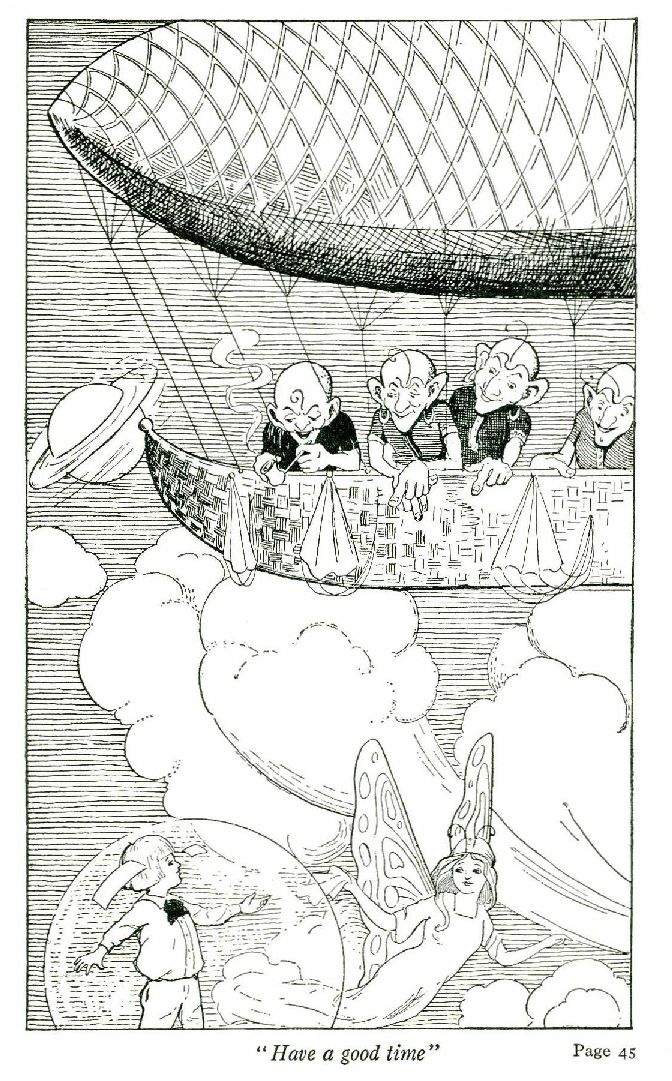
Bobbie began to be frightened. He didn't think he'd enjoy doing any such thing. He was wishing he'd never come with the Winds when he heard a great commotion behind him, and their father, old King Eolus himself, came puffing up.
“Here, you young scalawags,” he shouted in a big voice, “what's all this nonsense? Where are you going? I know where you are going—you 're going home, straight home.”
“Sorry, sir,” said West Wind impudently, “but we told the fairy queen we'd take her friend Bobbie to the Rainbow.”
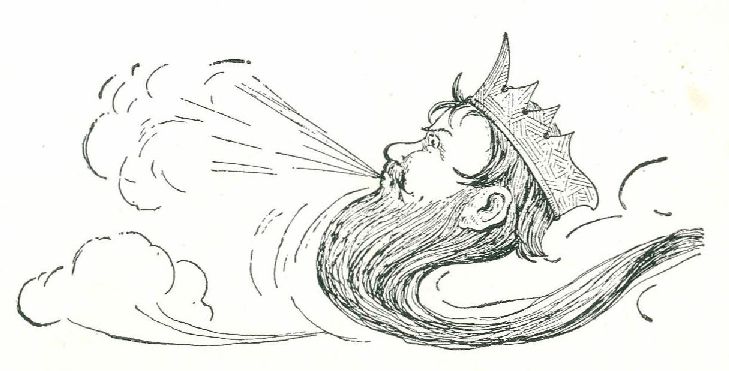
“I'll take him there myself,” said the old king. “That's just what I'm here for.” So the four Winds had to say good-by to Bobbie and go back home; and Bobbie wasn't sorry to see them go, either.
“My messengers, the geese, told me yesterday that you were up here,” said the old king. “I've been on the lookout for you ever since. I was afraid you'd fall in with those rascals of mine. They 're good boys,” he added, not stopping to think he'd just called them rascals, “good boys, but young.”
“Oh,” said Bobbie.
Then old King Eolus and Bobbie traveled on together until they came to a great shimmering many-colored arch. At the foot of the arch stood the Rainbow Dwarf beside the pot of gold, and piled around him were bags of coins and jewels, chests of silver, and wonderful jars and horns of precious metal. Their splendor dazzled one's eyes.
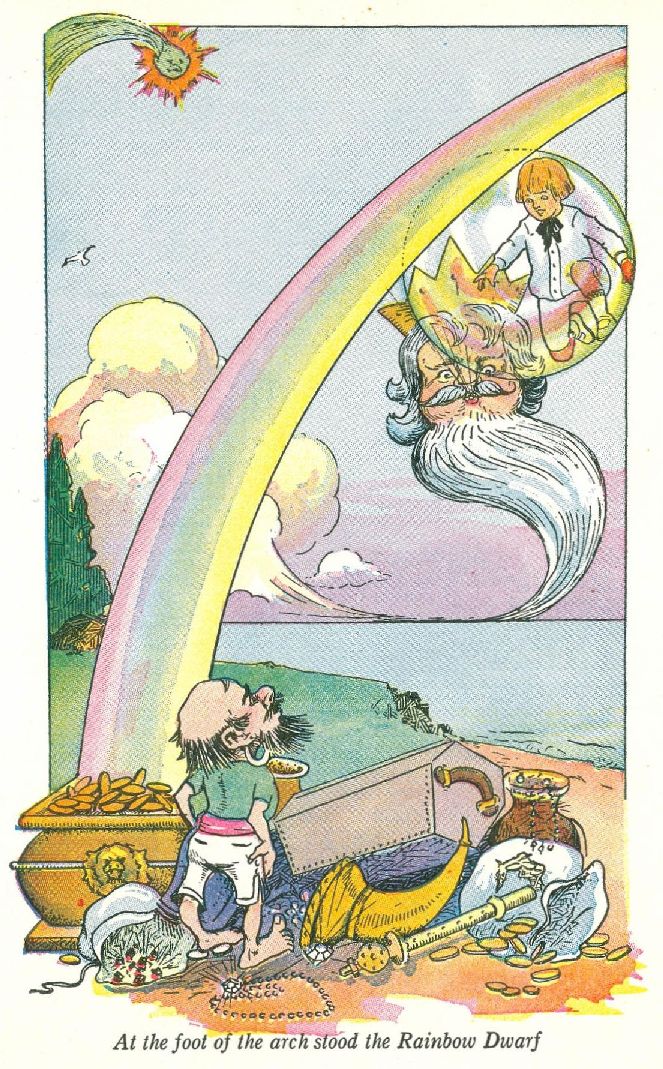
“All hail!” cried the dwarf.
“Good day!” cried King Eolus. “No hail in this weather.”
But the Rainbow Dwarf didn't seem to see that any joke was intended, and was as solemn as an owl.
“Did you see my daughters?” he asked Bobbie, so suddenly poor Bobbie could only gasp for a moment.
“Did you see my daughters in Flower-land?” he questioned again.
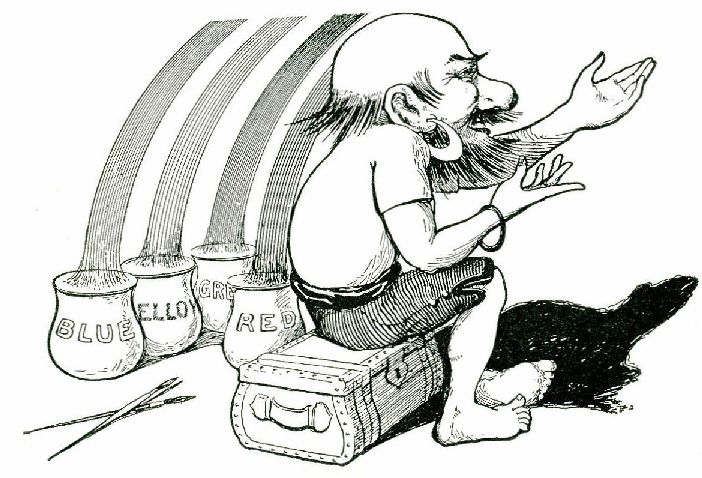
“Oh, the Rainbow Fairies,” answered Bobbie. “Yes; but why do they live in Flowerland? Why don't they live here with you?”
“Listen to me, son,” answered the dwarf solemnly. “Listen to me. My daughters are the artists for all Fairyland. I taught them to paint here in the Rainbow, and now they paint all the flowers and trees and green things that grow. That's why they live in Flowerland. But they often come to visit me, and of course they have to come back to the Rainbow to get their paint.”
Just then Bobbie heard the soft fluttering of wings, and looking up he saw coming toward him the seven dainty Rainbow Fairies. With them was the fairy queen seated on her golden butterfly and driving her brilliant butterfly team. Bobbie was very glad to see the beautiful little fairies again, and they all greeted him and the little dwarf affectionately.
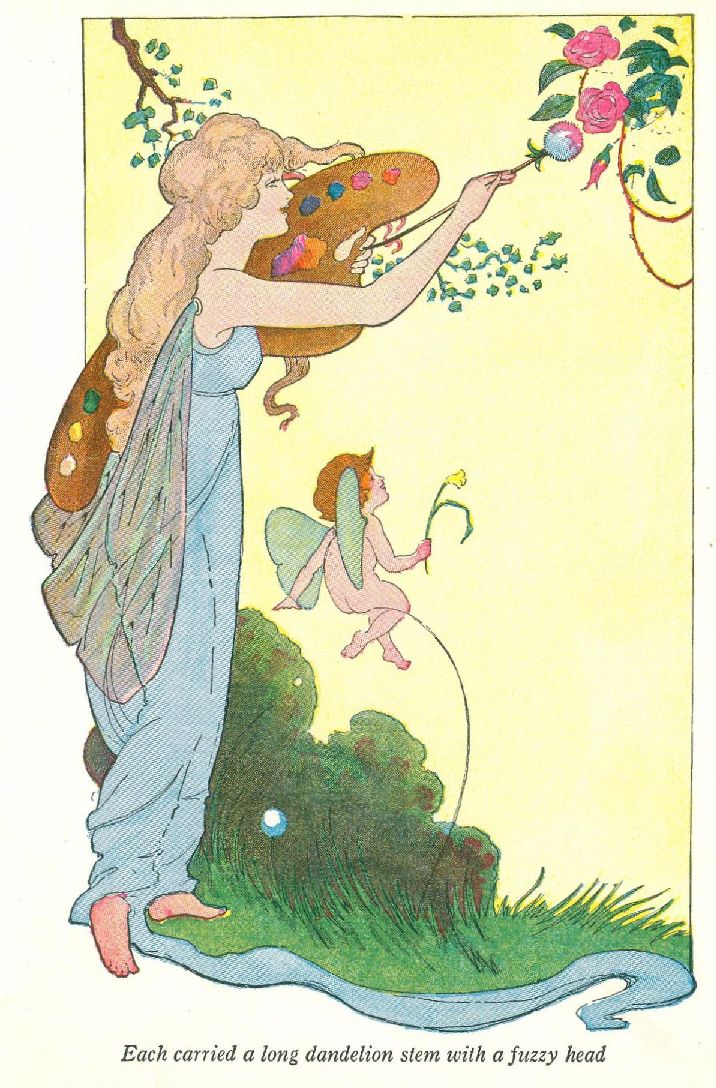
But the fairies seemed in a great hurry. Each carried a long dandelion stem with a fuzzy white head. One by one they went up to the rainbow, dipped the dandelion brush in gleaming color, and, in a second, were off again to Flowerland. The fairy queen told Bobbie of the new violets and buttercups, nodding sunflowers, and fields of new grass waiting to be painted by the Rainbow Fairies. Then she bade Bobbie good-by once more, and waving her hand to the dwarf, mounted her shining steed and flew swiftly away toward the golden sun.
As Bobbie watched her, old King Eolus came puffing back from the chest of silver he'd been examining. “Time for me to be off again,” he said. “Old Eolus can't stay in one place very long, you know. Come on, Bobbie, and I'll start you on your way home!”
“Here, here,” cried the dwarf, “before you go, help yourself to some of this treasure. It's the prize for reaching the Rainbow's end, and you've done it, Bobbie.”
But again Bobbie could not reach through the bubble, and much as he hated to leave the glittering coins and sparkling stones, there seemed no help for it. He was just about to thank the dwarf for his kindness, however, when the dwarf said, “Next time you see the Raindrops, dig in your back yard. They are my messengers, and I'll send the gold by them.”
So Bobbie thanked the dwarf for his promise, and bade him good-by. Then old King Eolus puffed out his cheeks and with a mighty breath sent the bubble spinning. Faster and faster it sped through space, and what with going so fast and thinking so hard about the gold the dwarf had promised him, Bobbie never noticed what was happening around him until he heard a hoarse voice shouting, “Off the track! Off the track! Off the track!”
Imagine how shocked he was to see coming toward him a most remarkable person who was all head and no body—though at first glance the long sandy beard that trailed out behind him took the place of a body. But, indeed, he was no gentleman in any sense of the word. He had wicked looking eyes, and as he shouted again he pointed with one of his great ears.
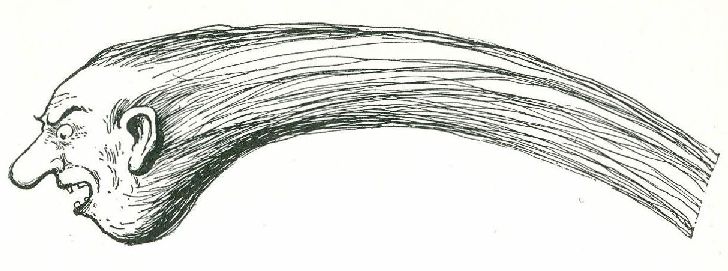
“Off the track! Off the track! Off the track!” he repeated at the top of his voice.
Now Bobbie could n't see any track, and of course he couldn't have got off of his own accord if he had seen one. This curious person was coming like a fire engine, too, and things certainly seemed in a bad way.
“He's just like those silly geese,” thought Bobbie. “Folks up here in the sky are always telling other folks to get out of the way!”
Now the air was filled with a terrible rushing sound and the curious person was shouting away louder than ever. “Clear the road, clear the road there for the Comet Express!”
“Whizaphats!” thought Bobbie. “Comet Express! Why, he can't stop—expresses never stop—and I can't—and—I'll signal him!”
He grabbed at his red tie and, pulling it off his neck, waved it round and round his head. Too late—the Comet Expressman still dashed madly on.
“Say,” cried Bobbie, “don't you see this signal? Danger! Danger, I tell you! There'll be a collision!”
Bobbie grew more and more excited as he watched the grinning head with the long sandy beard rushing on and on. As it neared the Milky Way a flock of goats scurried wildly across its path and a herd of cows kicked up their heels and ran to the farthest corner of their pink pasture. And just then, with a fearful swoop, the Comet Express bore down upon Bobbie and the wonderful bubble.
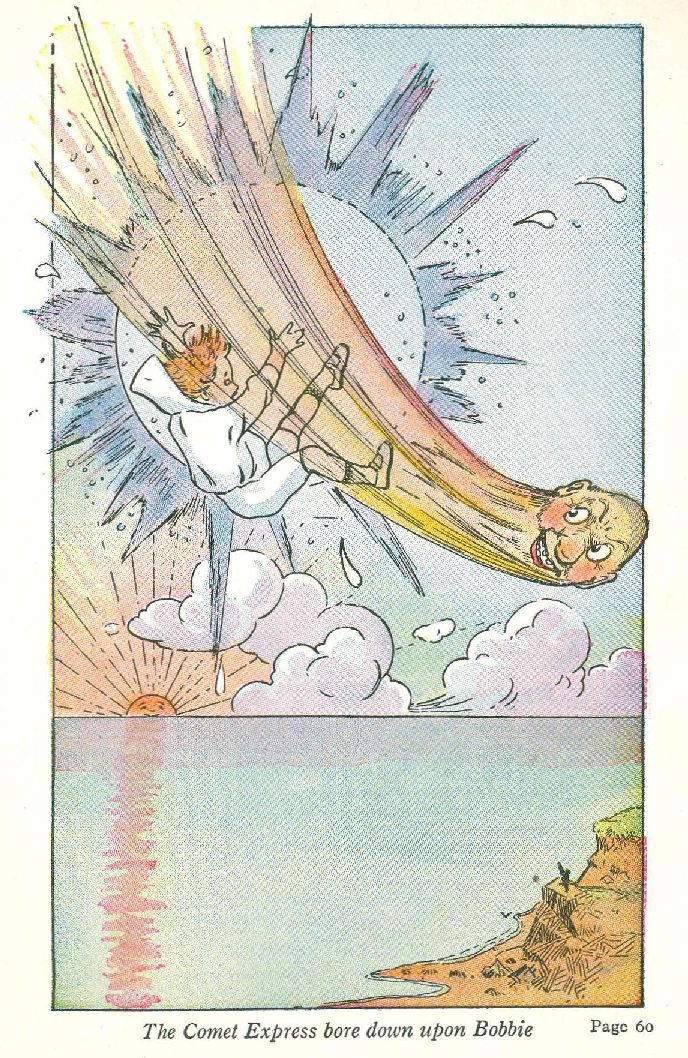
Whiz! Buzz! Boom! With a whirl and dash the rushing head came tearing along, then—Zip! Spat!
The bubble was splashing in a burst of water and light. The Comet Expressman looked back with an evil grin, and Bobbie went hurtling down—down—over and over—down—down. There below him was the big, deep sea. Down—down went Bobbie, and you may be sure he had no chance to think of any way to stop himself. Sometimes his head was where his heels ought to be, and sometimes he spun around like a top. And what was worse yet, once in a while, as he whirled about, he caught sight of the Comet Expressman, and that hideous head with the long sandy beard trailing out behind would wiggle its ears and grin.
My! but Bobbie would have given anything to get hold of that long trailing sandy beard and give it a sharp tug or two.
But just holding his breath gave Bobbie enough to do.
Down—down—he fell—over and over—down and down. He caught one more sight of the wiggling ears when—Splash!
But to his surprise Bobbie did n't stop. He kept on going down, down through the soft green water. Away, 'way down he went, to the bottom of the deep sea.
“Well, anyway,” thought he, “I'm done with the Comet Expressman.”
He could see nothing but water, and more water, and he certainly felt wet clear through. Then, having reached the bottom, Bobbie had another surprise. He began going up again as fast as he had gone down, and in a moment found himself on the surface, being carried swiftly along by a great foaming wave that was rushing toward the sandy shore, and—
Bump!
There sat Bobbie in his garden at home!
No wonder he was wet. The bubble bowl was upset and Fluff, the poodle, was just disappearing behind the lilac bush. The soapy water made a nice, cold, soaky puddle.
A big, round, shining moon that made him think of the Comet Expressman seemed to be looking down and laughing at him.
The garden was very quiet. Looking around, Bobbie spied a little white fuzzy head close beside him.
“Fairy paint brush! Humph!” thought Bobbie, and he reached over to pluck a blade of grass. “Why, I declare,” he said, “the little new shoot just peeping out of the ground has almost no color at all. Think of all the grass that's been painted right in our own yard! Those Rainbow Fairies certainly have a good deal of work to do.” As Bobbie stood up, Fluff came bounding back. He leaped upon his little master as joyfully as though he had n't seen him for days and weeks. For a minute Bobbie felt that he really had been away on a long, long journey. Then he glanced down at the soapy little puddle behind him.
“Fluff, sir,” he said with a frown, pretending to be very angry, “look at what you've done, and look at my clothes! But my whizaphats!” he added, seizing Fluff's paws. “If that dream had been true your ocean would have saved my life. If I'd landed on the ground when the Comet Expressman hit me, no telling what would have happened!”
Just then the tea bell rang. “Come on, Fluff,” Bobbie cried, starting for the house, “come on. We can get a drink of milk here, even if it isn't the Milky Way!”
End of the Project Gutenberg EBook of Bobbie Bubbles, by
E. Hugh Sherwood and Maud Gridley Budlong
*** END OF THIS PROJECT GUTENBERG EBOOK BOBBIE BUBBLES ***
***** This file should be named 45070-h.htm or 45070-h.zip *****
This and all associated files of various formats will be found in:
http://www.gutenberg.org/4/5/0/7/45070/
Produced by David Widger from page images generously
provided by The Internet Archive
Updated editions will replace the previous one--the old editions
will be renamed.
Creating the works from public domain print editions means that no
one owns a United States copyright in these works, so the Foundation
(and you!) can copy and distribute it in the United States without
permission and without paying copyright royalties. Special rules,
set forth in the General Terms of Use part of this license, apply to
copying and distributing Project Gutenberg-tm electronic works to
protect the PROJECT GUTENBERG-tm concept and trademark. Project
Gutenberg is a registered trademark, and may not be used if you
charge for the eBooks, unless you receive specific permission. If you
do not charge anything for copies of this eBook, complying with the
rules is very easy. You may use this eBook for nearly any purpose
such as creation of derivative works, reports, performances and
research. They may be modified and printed and given away--you may do
practically ANYTHING with public domain eBooks. Redistribution is
subject to the trademark license, especially commercial
redistribution.
*** START: FULL LICENSE ***
THE FULL PROJECT GUTENBERG LICENSE
PLEASE READ THIS BEFORE YOU DISTRIBUTE OR USE THIS WORK
To protect the Project Gutenberg-tm mission of promoting the free
distribution of electronic works, by using or distributing this work
(or any other work associated in any way with the phrase “Project
Gutenberg”), you agree to comply with all the terms of the Full Project
Gutenberg-tm License available with this file or online at
www.gutenberg.org/license.
Section 1. General Terms of Use and Redistributing Project Gutenberg-tm
electronic works
1.A. By reading or using any part of this Project Gutenberg-tm
electronic work, you indicate that you have read, understand, agree to
and accept all the terms of this license and intellectual property
(trademark/copyright) agreement. If you do not agree to abide by all
the terms of this agreement, you must cease using and return or destroy
all copies of Project Gutenberg-tm electronic works in your possession.
If you paid a fee for obtaining a copy of or access to a Project
Gutenberg-tm electronic work and you do not agree to be bound by the
terms of this agreement, you may obtain a refund from the person or
entity to whom you paid the fee as set forth in paragraph 1.E.8.
1.B. “Project Gutenberg” is a registered trademark. It may only be
used on or associated in any way with an electronic work by people who
agree to be bound by the terms of this agreement. There are a few
things that you can do with most Project Gutenberg-tm electronic works
even without complying with the full terms of this agreement. See
paragraph 1.C below. There are a lot of things you can do with Project
Gutenberg-tm electronic works if you follow the terms of this agreement
and help preserve free future access to Project Gutenberg-tm electronic
works. See paragraph 1.E below.
1.C. The Project Gutenberg Literary Archive Foundation (“the Foundation”
or PGLAF), owns a compilation copyright in the collection of Project
Gutenberg-tm electronic works. Nearly all the individual works in the
collection are in the public domain in the United States. If an
individual work is in the public domain in the United States and you are
located in the United States, we do not claim a right to prevent you from
copying, distributing, performing, displaying or creating derivative
works based on the work as long as all references to Project Gutenberg
are removed. Of course, we hope that you will support the Project
Gutenberg-tm mission of promoting free access to electronic works by
freely sharing Project Gutenberg-tm works in compliance with the terms of
this agreement for keeping the Project Gutenberg-tm name associated with
the work. You can easily comply with the terms of this agreement by
keeping this work in the same format with its attached full Project
Gutenberg-tm License when you share it without charge with others.
1.D. The copyright laws of the place where you are located also govern
what you can do with this work. Copyright laws in most countries are in
a constant state of change. If you are outside the United States, check
the laws of your country in addition to the terms of this agreement
before downloading, copying, displaying, performing, distributing or
creating derivative works based on this work or any other Project
Gutenberg-tm work. The Foundation makes no representations concerning
the copyright status of any work in any country outside the United
States.
1.E. Unless you have removed all references to Project Gutenberg:
1.E.1. The following sentence, with active links to, or other immediate
access to, the full Project Gutenberg-tm License must appear prominently
whenever any copy of a Project Gutenberg-tm work (any work on which the
phrase “Project Gutenberg” appears, or with which the phrase “Project
Gutenberg” is associated) is accessed, displayed, performed, viewed,
copied or distributed:
This eBook is for the use of anyone anywhere at no cost and with
almost no restrictions whatsoever. You may copy it, give it away or
re-use it under the terms of the Project Gutenberg License included
with this eBook or online at www.gutenberg.org
1.E.2. If an individual Project Gutenberg-tm electronic work is derived
from the public domain (does not contain a notice indicating that it is
posted with permission of the copyright holder), the work can be copied
and distributed to anyone in the United States without paying any fees
or charges. If you are redistributing or providing access to a work
with the phrase “Project Gutenberg” associated with or appearing on the
work, you must comply either with the requirements of paragraphs 1.E.1
through 1.E.7 or obtain permission for the use of the work and the
Project Gutenberg-tm trademark as set forth in paragraphs 1.E.8 or
1.E.9.
1.E.3. If an individual Project Gutenberg-tm electronic work is posted
with the permission of the copyright holder, your use and distribution
must comply with both paragraphs 1.E.1 through 1.E.7 and any additional
terms imposed by the copyright holder. Additional terms will be linked
to the Project Gutenberg-tm License for all works posted with the
permission of the copyright holder found at the beginning of this work.
1.E.4. Do not unlink or detach or remove the full Project Gutenberg-tm
License terms from this work, or any files containing a part of this
work or any other work associated with Project Gutenberg-tm.
1.E.5. Do not copy, display, perform, distribute or redistribute this
electronic work, or any part of this electronic work, without
prominently displaying the sentence set forth in paragraph 1.E.1 with
active links or immediate access to the full terms of the Project
Gutenberg-tm License.
1.E.6. You may convert to and distribute this work in any binary,
compressed, marked up, nonproprietary or proprietary form, including any
word processing or hypertext form. However, if you provide access to or
distribute copies of a Project Gutenberg-tm work in a format other than
“Plain Vanilla ASCII” or other format used in the official version
posted on the official Project Gutenberg-tm web site (www.gutenberg.org),
you must, at no additional cost, fee or expense to the user, provide a
copy, a means of exporting a copy, or a means of obtaining a copy upon
request, of the work in its original “Plain Vanilla ASCII” or other
form. Any alternate format must include the full Project Gutenberg-tm
License as specified in paragraph 1.E.1.
1.E.7. Do not charge a fee for access to, viewing, displaying,
performing, copying or distributing any Project Gutenberg-tm works
unless you comply with paragraph 1.E.8 or 1.E.9.
1.E.8. You may charge a reasonable fee for copies of or providing
access to or distributing Project Gutenberg-tm electronic works provided
that
- You pay a royalty fee of 20% of the gross profits you derive from
the use of Project Gutenberg-tm works calculated using the method
you already use to calculate your applicable taxes. The fee is
owed to the owner of the Project Gutenberg-tm trademark, but he
has agreed to donate royalties under this paragraph to the
Project Gutenberg Literary Archive Foundation. Royalty payments
must be paid within 60 days following each date on which you
prepare (or are legally required to prepare) your periodic tax
returns. Royalty payments should be clearly marked as such and
sent to the Project Gutenberg Literary Archive Foundation at the
address specified in Section 4, “Information about donations to
the Project Gutenberg Literary Archive Foundation.”
- You provide a full refund of any money paid by a user who notifies
you in writing (or by e-mail) within 30 days of receipt that s/he
does not agree to the terms of the full Project Gutenberg-tm
License. You must require such a user to return or
destroy all copies of the works possessed in a physical medium
and discontinue all use of and all access to other copies of
Project Gutenberg-tm works.
- You provide, in accordance with paragraph 1.F.3, a full refund of any
money paid for a work or a replacement copy, if a defect in the
electronic work is discovered and reported to you within 90 days
of receipt of the work.
- You comply with all other terms of this agreement for free
distribution of Project Gutenberg-tm works.
1.E.9. If you wish to charge a fee or distribute a Project Gutenberg-tm
electronic work or group of works on different terms than are set
forth in this agreement, you must obtain permission in writing from
both the Project Gutenberg Literary Archive Foundation and Michael
Hart, the owner of the Project Gutenberg-tm trademark. Contact the
Foundation as set forth in Section 3 below.
1.F.
1.F.1. Project Gutenberg volunteers and employees expend considerable
effort to identify, do copyright research on, transcribe and proofread
public domain works in creating the Project Gutenberg-tm
collection. Despite these efforts, Project Gutenberg-tm electronic
works, and the medium on which they may be stored, may contain
“Defects,” such as, but not limited to, incomplete, inaccurate or
corrupt data, transcription errors, a copyright or other intellectual
property infringement, a defective or damaged disk or other medium, a
computer virus, or computer codes that damage or cannot be read by
your equipment.
1.F.2. LIMITED WARRANTY, DISCLAIMER OF DAMAGES - Except for the “Right
of Replacement or Refund” described in paragraph 1.F.3, the Project
Gutenberg Literary Archive Foundation, the owner of the Project
Gutenberg-tm trademark, and any other party distributing a Project
Gutenberg-tm electronic work under this agreement, disclaim all
liability to you for damages, costs and expenses, including legal
fees. YOU AGREE THAT YOU HAVE NO REMEDIES FOR NEGLIGENCE, STRICT
LIABILITY, BREACH OF WARRANTY OR BREACH OF CONTRACT EXCEPT THOSE
PROVIDED IN PARAGRAPH 1.F.3. YOU AGREE THAT THE FOUNDATION, THE
TRADEMARK OWNER, AND ANY DISTRIBUTOR UNDER THIS AGREEMENT WILL NOT BE
LIABLE TO YOU FOR ACTUAL, DIRECT, INDIRECT, CONSEQUENTIAL, PUNITIVE OR
INCIDENTAL DAMAGES EVEN IF YOU GIVE NOTICE OF THE POSSIBILITY OF SUCH
DAMAGE.
1.F.3. LIMITED RIGHT OF REPLACEMENT OR REFUND - If you discover a
defect in this electronic work within 90 days of receiving it, you can
receive a refund of the money (if any) you paid for it by sending a
written explanation to the person you received the work from. If you
received the work on a physical medium, you must return the medium with
your written explanation. The person or entity that provided you with
the defective work may elect to provide a replacement copy in lieu of a
refund. If you received the work electronically, the person or entity
providing it to you may choose to give you a second opportunity to
receive the work electronically in lieu of a refund. If the second copy
is also defective, you may demand a refund in writing without further
opportunities to fix the problem.
1.F.4. Except for the limited right of replacement or refund set forth
in paragraph 1.F.3, this work is provided to you 'AS-IS', WITH NO OTHER
WARRANTIES OF ANY KIND, EXPRESS OR IMPLIED, INCLUDING BUT NOT LIMITED TO
WARRANTIES OF MERCHANTABILITY OR FITNESS FOR ANY PURPOSE.
1.F.5. Some states do not allow disclaimers of certain implied
warranties or the exclusion or limitation of certain types of damages.
If any disclaimer or limitation set forth in this agreement violates the
law of the state applicable to this agreement, the agreement shall be
interpreted to make the maximum disclaimer or limitation permitted by
the applicable state law. The invalidity or unenforceability of any
provision of this agreement shall not void the remaining provisions.
1.F.6. INDEMNITY - You agree to indemnify and hold the Foundation, the
trademark owner, any agent or employee of the Foundation, anyone
providing copies of Project Gutenberg-tm electronic works in accordance
with this agreement, and any volunteers associated with the production,
promotion and distribution of Project Gutenberg-tm electronic works,
harmless from all liability, costs and expenses, including legal fees,
that arise directly or indirectly from any of the following which you do
or cause to occur: (a) distribution of this or any Project Gutenberg-tm
work, (b) alteration, modification, or additions or deletions to any
Project Gutenberg-tm work, and (c) any Defect you cause.
Section 2. Information about the Mission of Project Gutenberg-tm
Project Gutenberg-tm is synonymous with the free distribution of
electronic works in formats readable by the widest variety of computers
including obsolete, old, middle-aged and new computers. It exists
because of the efforts of hundreds of volunteers and donations from
people in all walks of life.
Volunteers and financial support to provide volunteers with the
assistance they need are critical to reaching Project Gutenberg-tm's
goals and ensuring that the Project Gutenberg-tm collection will
remain freely available for generations to come. In 2001, the Project
Gutenberg Literary Archive Foundation was created to provide a secure
and permanent future for Project Gutenberg-tm and future generations.
To learn more about the Project Gutenberg Literary Archive Foundation
and how your efforts and donations can help, see Sections 3 and 4
and the Foundation information page at www.gutenberg.org
Section 3. Information about the Project Gutenberg Literary Archive
Foundation
The Project Gutenberg Literary Archive Foundation is a non profit
501(c)(3) educational corporation organized under the laws of the
state of Mississippi and granted tax exempt status by the Internal
Revenue Service. The Foundation's EIN or federal tax identification
number is 64-6221541. Contributions to the Project Gutenberg
Literary Archive Foundation are tax deductible to the full extent
permitted by U.S. federal laws and your state's laws.
The Foundation's principal office is located at 4557 Melan Dr. S.
Fairbanks, AK, 99712., but its volunteers and employees are scattered
throughout numerous locations. Its business office is located at 809
North 1500 West, Salt Lake City, UT 84116, (801) 596-1887. Email
contact links and up to date contact information can be found at the
Foundation's web site and official page at www.gutenberg.org/contact
For additional contact information:
Dr. Gregory B. Newby
Chief Executive and Director
[email protected]
Section 4. Information about Donations to the Project Gutenberg
Literary Archive Foundation
Project Gutenberg-tm depends upon and cannot survive without wide
spread public support and donations to carry out its mission of
increasing the number of public domain and licensed works that can be
freely distributed in machine readable form accessible by the widest
array of equipment including outdated equipment. Many small donations
($1 to $5,000) are particularly important to maintaining tax exempt
status with the IRS.
The Foundation is committed to complying with the laws regulating
charities and charitable donations in all 50 states of the United
States. Compliance requirements are not uniform and it takes a
considerable effort, much paperwork and many fees to meet and keep up
with these requirements. We do not solicit donations in locations
where we have not received written confirmation of compliance. To
SEND DONATIONS or determine the status of compliance for any
particular state visit www.gutenberg.org/donate
While we cannot and do not solicit contributions from states where we
have not met the solicitation requirements, we know of no prohibition
against accepting unsolicited donations from donors in such states who
approach us with offers to donate.
International donations are gratefully accepted, but we cannot make
any statements concerning tax treatment of donations received from
outside the United States. U.S. laws alone swamp our small staff.
Please check the Project Gutenberg Web pages for current donation
methods and addresses. Donations are accepted in a number of other
ways including checks, online payments and credit card donations.
To donate, please visit: www.gutenberg.org/donate
Section 5. General Information About Project Gutenberg-tm electronic
works.
Professor Michael S. Hart was the originator of the Project Gutenberg-tm
concept of a library of electronic works that could be freely shared
with anyone. For forty years, he produced and distributed Project
Gutenberg-tm eBooks with only a loose network of volunteer support.
Project Gutenberg-tm eBooks are often created from several printed
editions, all of which are confirmed as Public Domain in the U.S.
unless a copyright notice is included. Thus, we do not necessarily
keep eBooks in compliance with any particular paper edition.
Most people start at our Web site which has the main PG search facility:
www.gutenberg.org
This Web site includes information about Project Gutenberg-tm,
including how to make donations to the Project Gutenberg Literary
Archive Foundation, how to help produce our new eBooks, and how to
subscribe to our email newsletter to hear about new eBooks.